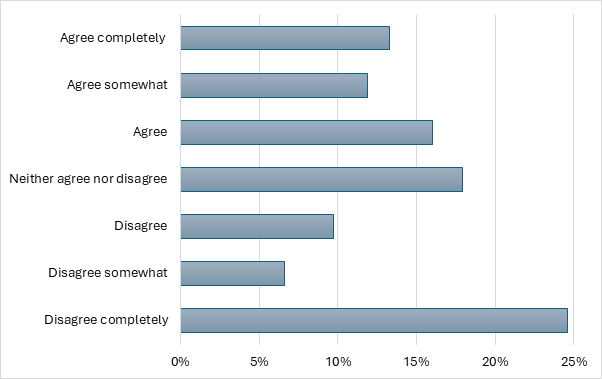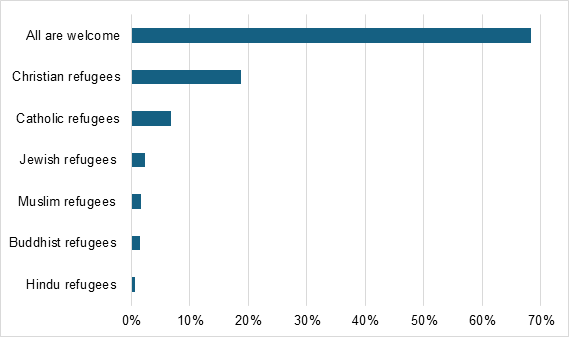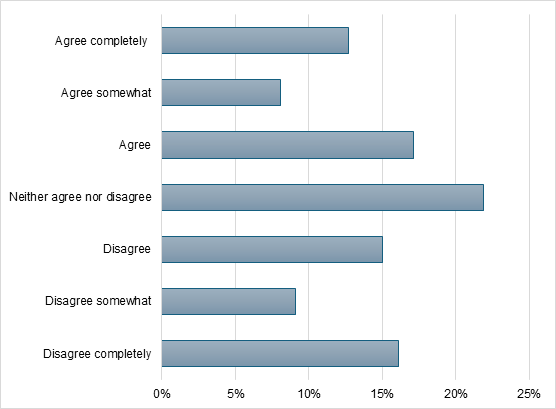 At a rally last December, former President Donald Trump stated that immigration was “poisoning the blood of our country.” Shyam K. Sriram looks at the history of nativism and anti-immigration sentiments in the US. In new survey research, he finds that over 40 percent of Americans agreed with Trump’s statement and over 30 percent feel that it is too easy for immigrants to become American citizens.
At a rally last December, former President Donald Trump stated that immigration was “poisoning the blood of our country.” Shyam K. Sriram looks at the history of nativism and anti-immigration sentiments in the US. In new survey research, he finds that over 40 percent of Americans agreed with Trump’s statement and over 30 percent feel that it is too easy for immigrants to become American citizens.
On December 16th, 2023, while speaking at a campaign rally in Durham, New Hampshire, former President Donald Trump described immigration as “poisoning the blood of our country.” Even after receiving pushback, the former president repeated the language on Truth Social, then during a radio interview on December 22nd, and again at another rally in Iowa.
Nativism and anti-immigrant sentiments in the US
The belief that some immigrants are not beneficial to the United States and are a threat to our morality and nationality is also known as nativism, and has a long, and deadly history. Nativism was reflected in the 19th-century anti-Catholic Know-Nothing Party (aptly named); the 1882 Chinese Exclusion Act, assaults, and even the murder of Chinese workers; anti-German violence and propaganda during World War I; the fictional concerns of Japanese American collusion following Pearl Harbor (and their subsequent incarceration from 1942 to 1946); and even in Donald Trump’s 21st-century rhetoric describing Mexicans as rapists.
An even more extreme version of nativism is the basis for the pseudoscientific and racist replacement theory. Supporters believe that white birthrates cannot compete with those of people of color which will in turn lead to what they term “white genocide”, a loss of masculinity, and a loss of racial purity. According to a 2020 report from the Carnegie Endowment for International Peace, nativists remain resolute that some immigrants are not welcome in the US and should not have the same democratic rights as others; should have less influence on public policy; and are inferior citizens (even if naturalized).
It would be easy enough to dismiss Trump’s statements as another episode of inflammatory rhetoric dating back to his 2015 attacks on Syrian refugees, even before his electoral win. But as almost a decade now of analysis has shown, his supporters often respond positively to such statements, echoing the University of Pennsylvania’s Dan Hopkins’ theory of politicized spaces: elite rhetoric can influence views about immigration independent of native-born Americans even without directly interacting with immigrants.
New survey evidence on Americans’ attitudes towards immigrants
Are Americans nativist? Drawing on new data drawn from a January 2024 Verasight national sample, we have evidence for the first time that shows not just how many Americans support Trump, but also how their views on issues related to immigrants and refugees. The Verasight sample was weighted to reflect the national population in terms of race, gender, party affiliation, and education.

“Immigration Protest” by Travis Wise is licensed under CC BY 2.0
When asked their level of support (Figure 1), just under 28 percent of Americans agreed or somewhat agreed with former President Trump’s statement: that immigrants are “destroying the blood of our country,” and 13.3 percent of the sample agreed completely.
Figure 1 – Americans’ support for Trump’s statement that immigrants are “destroying the blood of our country“

Regression analysis of the data also confirmed a number of major causal relationships and findings.
- Respondents who voted for Trump in 2020 were much more likely to support his December 2023 remarks on immigration and the blood of the country.
- Support for the Democratic Party, measured on a feelings thermometer from 0 (coldest) to 100 (warmest), caused a statistically significant decline in support for Trump’s comments; the opposite was confirmed for respondents’ support for the Republican Party, using a similar feeling thermometer.
- 16 percent of Americans believed that President Obama was not a US citizen by birth, which shows how pernicious this conspiracy theory has lasted, fifteen years after his inauguration. But even more concerning was that Americans who believe this are also more likely to support President Trump’s nativist statement on blood and nationalism.
Finally, when asked if limiting immigration from Mexico and Central America was a policy which would make “our country stronger” 27.7 percent of respondents agreed. This attitude also had a positive directly proportional relationship to supporting Trump’s December statement on immigration.
Another measure of nativist opinion was captured by asking respondents if they thought it was too easy to become a citizen (see Figure 2). While the level of support and opposition varied, it was alarming how many Americans had no opinion.
Figure 2 – Is it Too Easy to Naturalize?
Attitudes towards refugees’ religious beliefs
Some light in the darkness was manifest in response to a question asking participants to indicate the best “fit” among several groups. Although Americans prefer Christian refugees broadly and then Catholic refugees, as Figure 3 shows, almost 70 percent of Americans said religion did not matter when it came to accepting refugees. Should these findings assure us or offer caution particularly since so few thought Muslim and Jewish refugees were the best fit? And what does this say about the future of refugee acceptance in the United States, particularly those displaced from Palestine and some from Israel as well? Why are so many Americans supportive of Israel’s right to defend itself and simultaneously unsupportive of Jewish refugees? Perhaps this speaks to the philosemitism we discussed in a 2020 article for the USAPP blog.
Figure 3 – Support for refugees and their religion

- Please read our comments policy before commenting.
- Note: This article gives the views of the author, and not the position of USAPP – American Politics and Policy, nor the London School of Economics.
- Shortened URL for this post: https://bit.ly/49RoyCT








1 Comments